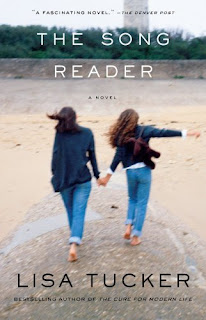The problem will be to tell you a bit about the story without giving away anything important, since the plot has several twists in it. This is really the story of two sisters, the older of whom mothers her younger sister and cares for an adopted boy-child as well. The reader knows from the beginning that there is a father somewhere, though he left when the youngest girl, Leeann, was about to begin school. A couple years after his departure, the mother is killed in a traffic accident, and Mary Beth, twelve years older than Leeann, becomes sole parent and sole provider. Mary Beth has a special talent which she sees as a calling; simply by asking people what songs they listen to, what songs recur in their day and night dreams, she is able to intuit much about them—about their loves, their fears, their problems, even their childhoods. Although working full time as a waitress to support her family, almost immediately upon discovering her talent, Mary Beth has cards made up advertising her calling: Mary Beth Norris, Song Reader/Life Healer, Let me help you make sense of the music in your head, [Family problems a specialty.]
And so this little novel begins, racing along, a kind of lark for the reader. Clever idea, I thought, and not so baseless. Indeed, it seemed I could read quite a lot about my own life simply by paying attention to the songs that have stuck with me, the ones that appear as if by magic upon my waking, and hover like the Norah Jones’ song, “One Flight Down” as I go through my day. The younger girl, Leeann, though never doubting her sister’s talent nor doubting the diagnoses and advice she gives to others, is mired in her own problem, namely, finding her lost father. Add a baby boy whom Mary Beth takes on almost as a kind of payment for one of her successful song readings and the story is ripe for development.
A nice read, I thought, between serious books—a kind of cupcake book to get me rolling again as a reader. But somehow, about half way through this book, it turned quite serious. Some questions I had been asking myself about how wise it would be to offer advice on the basis of song-reading began to emerge in very serious ways for Mary Beth. She runs into a tough case; a troubled woman referred to Mary Beth by a caring but rather desperate husband, but this woman insists that she has no songs, no song-memory. After a series of stunning successes, helping women reveal themselves to themselves via their song obsessions, Mary Beth is faced with a difficult case.
Having no songs is like having no dreams. It only happens when your mind is shutting down. Hiding from something.
Ah, but the secret is simply to uncover what has been covered up, to remember and confront—tell her husband, her son, and finally with those two men who love her as her shield, to confront her father once and for all.
I have no intention of revealing to you how this treatment turns out, but the book certainly becomes more interesting, deeper, more important from this point on. There are other additions to the mix: a man who comes to Mary Beth for help (although only after being somehow tricked into it by his concerned sister) is welcomed into the family. It turns out that he is a graduate student who is working on depression and brain chemistry, and if he is not overly impressed by Mary Beth’s song-reading methods, he is struck by her incredible sensitivity to others as well as by her beauty and her huge heart. His contention, however, is that Mary Beth concerns herself so often and so totally with others simply because she is unwilling to attend to herself. While she insists that taking over her sister’s care when their mother dies, taking on the unwanted baby of one of her clients, taking on every new person in need who comes to her, is simply a matter of course, he sees it as her frenzied attempt to hide from her own emotional problems.
Mary Beth’s breakdown and self-doubt are inevitable; she is aware of what her gift allows her to see, but not aware enough about the tremendous power and risk that comes with it.
No doubt there are some weaknesses in this plot, some problems too neatly solved, some serious questions that any attentive reader will have to ask themselves about the wisdom of song-reading. Still, there is a real beauty to the book, and even some genuine wisdom. Leeann comes to see how poverty limits possibility; she sees also that simply seeing the truth is not enough, and that confronting others with acts they have hidden is neither easy nor always wise. Men can and will lie even in the face of revelation, and the more awful the secrets, the more horrible the abuse, the more vigorous and bulldozing the defense and covering over. Only on television and in the movies does truth inevitably win out.
So, this is not a great book, but it is a good one. The bond between the sisters is wonderful and convincing, and the song-reading theme much more thought-provoking than you may think initially.
Of course the jacket cover proclaims a stunning debut by a major new voice, while the writing is described as achingly beautiful with every page inspiring courage. We are used to hyperbole on jacket covers. Instead, this is a very good first novel, and I would be surprised if it were not followed up by others at least as good, perhaps better. It’s also short and easy to read, and I recommend it to you.

